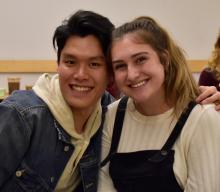By Emma York, LSJ Communications Student Assistant
Four Law, Societies, and Justice alumni recently visited campus to speak to current majors about their experience taking time off from school between their undergrad and graduate studies.
Their diverse pathways and wisdom helped students learn of the benefits of a gap year.
“In LSJ Advising, we often talk with students about their post-graduation plans and the benefits of a gap year”, says LSJ Adviser, Kyla Mayer. “The Gap Year Panel provides students with opportunities to hear directly from LSJ alumni and often prompts new considerations about their post-graduation plans.”
One panelist, Grace Nguyen, graduated from LSJ in 2016 and is currently a first year JD candidate at the UW School of Law. In her gap year, she worked at Pacific Law Group to explore different areas of law, and she traveled extensively. Reflecting on her path to law school, she found a gap year to increase her competitiveness as an applicant and inform what type of law she wanted to study.
“How can I stand out among all these applicants?” Nguyen said she asked herself. ”I used my gap year to figure out what direction I wanted to propel myself and then get there. If not for my gap year, I don’t think I would have been able to present my best self to schools.”
Anu Sidhu, a 2014 LSJ and Economics graduate, spent four years out of school, during which she worked for AmeriCorps, spent a year teaching English in Japan, and became a Program Coordinator for the Snohomish County Mental Health Court. She was able to recognize her interest for policy work and is now a student in the Masters in Public Administration at the Evans School.
“I felt like I knew what I was doing,” Sidhu said. “I thought I had questions that I wanted to answer through academia. Going through different jobs and experiences, I realized it is also interesting to live those questions. I found that policy was something that I had neglected.”
Kelsey Sanders graduated from LSJ and American Ethnic Studies in 2014, and is currently teaching Honors Language Arts and Social Studies at Eastlake High School in Sammamish, Washington. Before pursuing her Masters in Teaching, she worked several jobs -- insurance underwriter, nanny, basketball coach, forensic handwriting analyst, and barista.
“It was difficult,” Sanders said. “I realized every single day that doing an office job was not my thing. I didn’t have any purpose or motivation to be there. I ended up doing a bunch of oddball jobs.”
But this assortment of jobs taught her an important lesson, she said. “I think that was so important for me to appreciate the career that I have right now. It reminds me every day that I am doing the right thing.”
Reed Klein graduated in 2016 without an intended path toward a graduate degree and began working as a carpenter while continuing to volunteer at a prison. Finding meaning in his volunteer work, he ultimately became an addiction counselor and is now pursuing a Masters in Social Work at UW.
Klein considered pursuing a graduate degree to become a university professor, but realized he wanted to go in a different direction.
“The most helpful thing I was told [about going into academic research] was that you want to make sure you are motivated to answer a specific question,” he said. “For me, I thought there weren’t enough people actually in the field implementing the research. I realized I didn’t want to make knowledge, I wanted to apply knowledge.
For many students, there is a concern that a gap year will be perceived negatively by grad schools. But the alumni panelists all argued that a gap year is only beneficial, and can help set you apart from other applicants.
“The more professional experience you have, the more competitive you will be for those professional degrees,” advised Klein.
In preparing for student loan payments to begin, students must make financial considerations when seeking employment after graduation. This may push students toward less appealing options, but it is still possible to find meaning in these jobs, to supplement with volunteer work, and to utilize available resources.
Returning to academia may be a difficult transition, but understanding why you are pursuing a higher degree can provide the necessary motivation.
“It was an emotionally taxing program,” Sanders said about her masters’ degree. “To prepare, I had to get back in the mindset of putting school first and remembering that it's my passion and it’s my purpose.”
For LSJ Major, Valentina Guy, the Gap Year Panel was the reassurance that she needed to decide that a gap year actually might be a viable option. “As a first-generation college student, people I know don’t go to college, let alone take a gap year, so hearing about the various unique routes I could take in my year off painted a clear picture of what my future could look like”.
Parting with final pieces of advice, our panelists encouraged students to make a bucket list and begin to cross things off.
“Take the time to do things that you would never do. Use it as a time of exploration,” said Klein.
